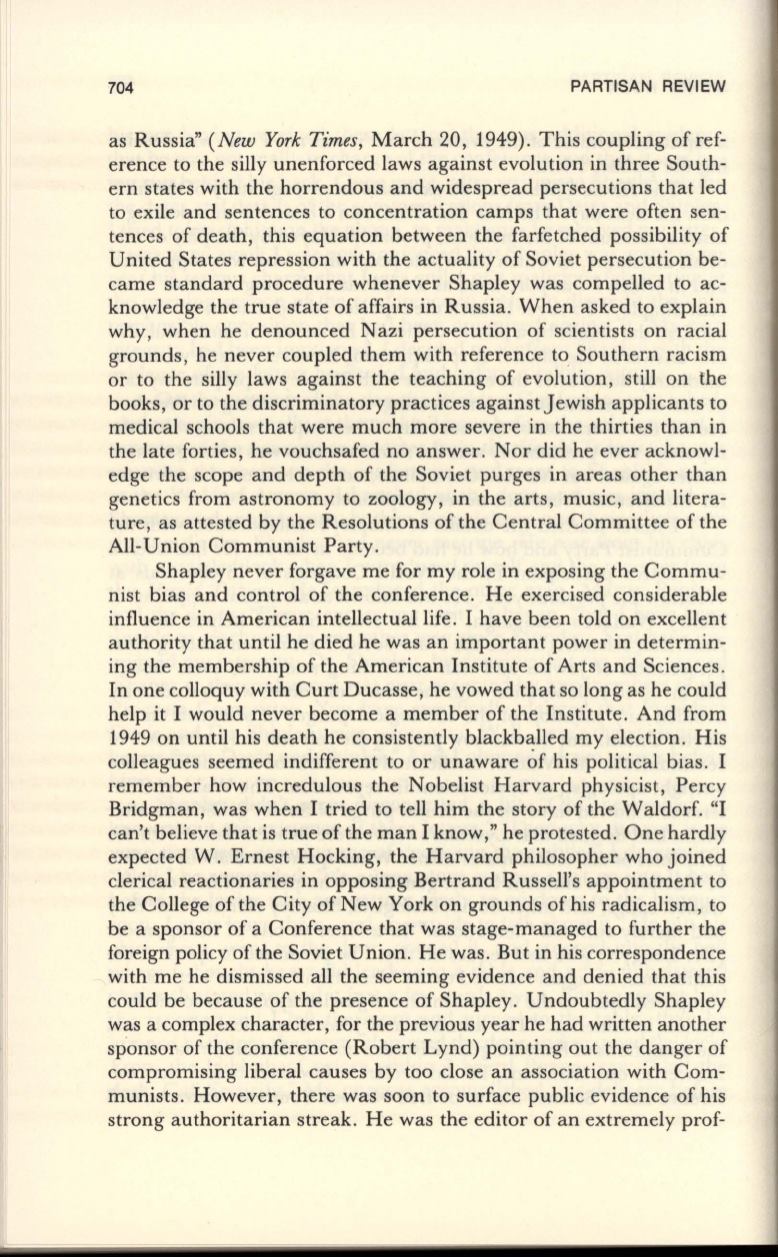
704
PARTISAN REVIEW
as Russia"
(New York Times,
March 20, 1949) . This coupling of ref–
erence to the silly unenforced laws against evolution in three South–
ern states with the horrendous and widespread persecutions that led
to exile and sentences to concentration camps that were often sen–
tences of death, this equation between the farfetched possibility of
United States repression with the actuality of Soviet persecution be–
came standard procedure whenever Shapley was compelled to ac–
knowledge the true state of affairs in Russia . When asked to explain
why, when he denounced Nazi persecution of scientists on racial
grounds, he never coupled them with reference to Southern racism
or to the silly laws against the teaching of evolution, still on the
books, or to the discriminatory practices against jewish applicants to
medical schools that were much more severe in the thirties than in
the late forties, he vouchsafed no answer. Nor did he ever acknowl–
edge the scope and depth of the Soviet purges in areas other than
genetics from astronomy to zoology, in the arts, music, and litera–
ture, as attested by the Resolutions of the Central Committee of the
All-Union Communist Party.
Shapley never forgave me for my role in exposing the Commu–
nist bias and control of the conference . He exercised considerable
influence in American intellectual life. I have been told on excellent
authority that until he died he was an important power in determin–
ing the membership of the American Institute of Arts and Sciences .
In one colloquy with Curt Ducasse, he vowed that so long as he could
help it I would never become a member of the Institute. And from
1949 on until his death he consistently blackballed my election. His
colleagues seemed indifferent to or unaware of his political bias. I
remember how incredulous the Nobelist Harvard physicist, Percy
Bridgman, was when I tried to tell him the story of the Waldorf. "I
can't believe that is true of the man I know," he protested. One hardly
expected W. Ernest Hocking, the Harvard philosopher who joined
clerical reactionaries in opposing Bertrand Russell's appointment to
the College of the City of New York on grounds ofhis radicalism, to
be a sponsor of a Conference that was stage-managed to further the
foreign policy of the Soviet Union. He was. But in his correspondence
with me he dismissed all the seeming evidence and denied that this
could be because of the presence of Shapley . Undoubtedly Shapley
was a complex character, for the previous year he had written another
sponsor of the conference (Robert Lynd) pointing out the danger of
compromising liberal causes by too close an association with Com–
munists. However, there was soon to surface public evidence of his
strong authoritarian streak. He was the editor of an extremely prof-


